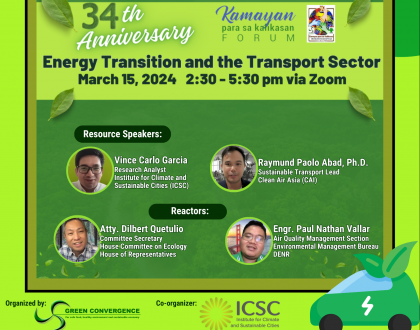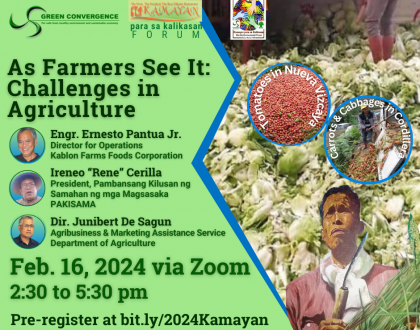Kamayan emphasizes forests’ role to greenhouse gas reduction

JUNE 15, 2018, Mandaluyong City – The 339th installment of the monthly Kamayan Para Sa Kalikasan Forum tackled the sustainable nationally determined contributions (NDCs) of the Philippines in its commitment to help reduce the global greenhouse gases as per the Paris Agreement of 2016.
Dr. Rowena Boquiren of the Haribon Foundation pointed out that the massive degradation of forests along with the rapid construction of greenhouse gas-emitting industries such as coal power plants and mining leads to the increase of the Philippines’ national contributions to the global greenhouse gases.
“Sino ba ang mga nagdedeforest at naglelevel down ng mga bundok? Paano makakabawas ng GHGs (global greenhouses gases) kung fina-fasttrack ang coal power plants?” she exclaimed.
(“Who are causing the deforestation and the flattening of mountains? How can we reduce GHGs if the there is a speedy construction of coal power plants?”)
She also questioned the commitment of the Climate Change Commission regarding urgent matters like this explaining that civil society organizations are ready to be of assistance.
“Gusto naming makasama sa consultation sa NDCs. Marami kaming gustong imungkahi. Pero hindi pa ito nangyayari. Wala daw kasi ang CCC (Climate Change Commission)” Boquiren claimed.
(“We wanted to join the consultation for NDCs. We have so many things to suggest. But this has never happened. CCC has not been present.”)
 Dr. Rowena Boquiren of Haribon Foundation (first from left) discussed the role of forests in addressing the problems caused by greenhouse gases together with Alex Alonzo of the Climate Change Commission (second from right) and Sr. Elizabeth Carranza of the Urgent Initiative (first from right).
Dr. Rowena Boquiren of Haribon Foundation (first from left) discussed the role of forests in addressing the problems caused by greenhouse gases together with Alex Alonzo of the Climate Change Commission (second from right) and Sr. Elizabeth Carranza of the Urgent Initiative (first from right).
“The pillars of the NDCs start with political commitment which is the support of the highest level of government, then scientific evidence and stakeholder engagement,” Alex Alonzo, representative of the Climate Change Commission said in his presentation.
A member of the audience, Randy Oliva of Green Convergence questioned the agency not being urgent enough to address issues on climate change in the country considering that they’re the main force in-charge to do so in the government.
“As per EO 174, CCC has influence over inventory accounting on NDCs. The Philippines is actually ahead of other countries, even developed ones when it comes to the institutional aspect of climate change mitigation. Other countries’ governments would have to engage with all their agencies to get climate change data,” Alonzo responded.
“Dominant pa rin ang issue ng political economy sa bansa natin. Climate change is triggered by anthropogenic destructions like monocapitalism, neoliberalism and even imperialism. Cultural revolution is needed to change our postcolonial mentality,” Boquiren said giving insights as to the limited capacities of the commission.
“The issue of political economy is still dominant in our country.”
This was in agreement with Sr. Elizabeth Carranza’s remarks that fossil fuel industries financed by developed countries as being largely responsible of global warming.
“The Philippines is one of the most vulnerable countries in the world to the impacts of climate change. Using Pope Francis’ Laudato Si, we call for ecological conversion and change in lifestyle in our country” she said.
Further emphasizing the urgency of NDCs, Boquiren mentioned that “Global temperatures will rise to 2.6 to 3.1 degrees Celsius by 2100. We have to be critical on the appropriations for each sector for the NDCs.”
Sr. Elizabeth Carranza of the Global Catholic Climate Movement (GCCM) Pilipinas and the Urgent Initiative, Alex Alonzo of the Climate Change Commission, and Dr. Rowena Boquiren of the Haribon Foundation served as speakers of the discussion.
Kamayan Para sa Kalikasan Forum is a monthly event of Green Convergence sponsored by Kamayan Restaurant EDSA and the Forest Foundation Philippines which aims to be an avenue for the public sector to have an exchange on environmental education.
Green Convergence for Safe Food, Healthy Environment and Sustainable Economy is a coalition of networks, organizations and individuals working for a development paradigm that addresses the need for social and economic upliftment, while preserving life-supporting water, air and land for generations to come.
Its other projects include the annual State of Nature Assessment or the Green SONA and the biennial Philippine Environment Summit where it recognizes the best environmental practices of local government units through the LGU Eco Champions.
Recommended Posts

Impacts of Development Projects on Indigenous Peoples
April 19, 2024

Energy Transition and the Transport Sector
March 15, 2024

As Farmers See It: Challenges in Agriculture
February 16, 2024
